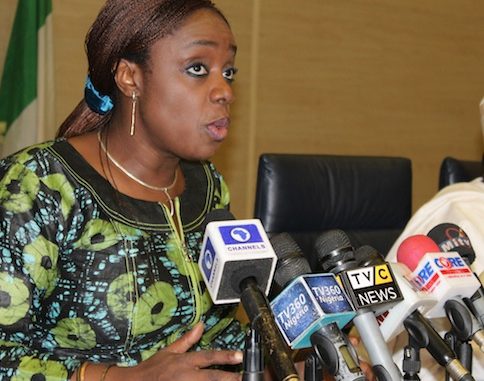
Minister of Finance, Mrs Kemi Adeosun, said inability of Federal Government to generate enough revenue to meet its obligation left it with no choice than to borrow to finance critical projects.
The minister said this on Thursday in Abuja while speaking at the 14th Daily Trust Dialogue which had “Beyond recession: Towards a Resilient Economy” as theme.
She said that with a huge monthly personnel expenditure of N210 billion and debt service burden of N120 billion, it was difficult to generate enough revenue to meet the obligations and fund capital projects.
While many people have faulted the borrowing plan of the government which seeks to borrow 29.9 billion dollars from foreign sources, Adeosun said Nigeria must get the loan if it must survive the economic crisis.
“My requirement every month – salaries, statutory transfers – every month, I need N210 billion.
“Debt, not the debt that we are planning to take but inherited debt, I need N120 billion just to service it. So every month I need N330 billion.
“Now for FAAC (Federation Accounts Allocation Committee), shared between Federal, States and Local Government, I require without capital budget, just recurrent is N700 billion.
“Just to give you an idea of where we are today, last month FAAC was N310 billion. So FG got about N140 billion, but I must cover N330 billion a month before we can do a single capital project.
“So, when we start the argument, should we borrow, should we not, the truth is that we have no choice.
“If you are waiting for the oil price to recover, the prognosis is that it’s not going to go back to 110 dollars per barrel any time soon.
“So, to get the economy growing, we have no choice but to look for low cost funds and put that infrastructure in place because it is the infrastructure that will unlock the economy,’’ she said.
Adeosun lamented that had the country adopted the steps being taken now to reduce expenditure through efficiency in spending when oil price was about 110 dollars per barrel, the country could not have slipped into recession.
For a more prudent management of government revenues, she said that the ministry planned to have in future, a holistic budget, capturing all the revenue generating agencies, especially CBN, NDIC and NNPC.
“We are also trying to ensure compliance with the Fiscal Responsibility Act. The agencies that are still outside of government, their size of revenue is actually more than the federal budget.
“In fact, IMF did a survey which shows that it’s 120 per cent, the size of our entire budget.
“So in other words, there is a parallel budget sitting outside the budget. The CBN, NDIC and NNPC; they sit outside the budget and we need to bring them in.
“They have to become more accountable and so we are working on that.
“The National Assembly has given us the support of ensuring that if these agencies do not submit their budget, they will not be able to pay anything other than salaries.
“These agencies were set up to be revenue generating for the government but they have become revenue generating for themselves; we need that money to come back into the central budget,” she said.
Adeosun also said that the Federal Government was going to clear all backlog of payments owed to its contractors, going forward.
She attributed the high rate of non-performing loans in the banking industry to the huge contract sums owed by government to its contractors that had collected loans to finance these contracts.
“So, we are working with the CBN to issue a promissory note to clear the backlog. When we clear the backlog then we start afresh.
“If you get a government contract, these are your payment terms, and that will also give us lower pricing.
“What we have discovered is that because people feel that there is a risk that they may not be paid, they load the price of the contract,” she said.
In his presentation, CBN Governor, Mr Godwin Emefiele, said that providing the much-needed foreign exchange to the manufacturing sector and financing agriculture reforms would continue to be a priority of the bank.
“In the midst of low oil prices, heavily depleted reserves, what can we do? We can only but manage the limited resources and that is why we will continue to do our best.
“Our priority today would be Nigerian masses, Nigerians and no other person. Within the limited resources at our disposal, we will continue to give emphasis to those who want to import raw materials.
“We will give emphasis to those who want to deploy plants and equipment that will help this country.
“We will direct support and emphasis to those who are going into agriculture, who are importing agricultural raw materials and implements because we love our country,” he said.
Also, Minister of Information and Culture, Alhaji Lai Mohammed, said that diversification was still an important element in re-inflating the economy.
“Our future does not lie in the rising oil price but in the capacity we have for discipline, for planning and to actually look at the economy no longer from a mono-cultural perspective but from a diversified perspective.
“It is interesting to know that that oil is responsible for about 90 to 95 per cent of our foreign earnings, yet it produces less than 10 per cent employment.
“So, the take-away is that there is no substitute in a modern economy for diversification, because diversification is what will help us grow our income and create a better middle class,” he said.
Source: NAN
mynet sunar